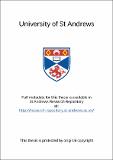Theoretical treatments of phase transitions in systems of polyatomic molecules
Abstract
As is well known, the microscopic and macroscopic properties of a system of molecules may he linked by means of the canonical partition function of statistical mechanics. In principle, a knowledge of the intermolecular forces is sufficient for us to predict the thermodynamic properties but, in practice, the partition function can be evaluated exactly only for some particularly simple systems. For more realistic systems we must resort to approximation methods. Even for monatomic molecules, interacting through a spherically symmetric pair potential, the application of approximation methods can be daunting and consequently little work has been done which takes account of the general polyatomic nature of molecules. In this thesis we attempt to rectify this omission in three different ways. In particular, we shall be concerned with the problem of melting in systems of polyatomic molecules.
The first method is an extension of a theory of melting due to Lennard-Jones and Devonshire and is an attempt at a microscopic treatment of a system where the barriers to molecular re-orientation are of a particularly simple nature. Similar models have been considered by Pople and Karasz and also by Amzel and Becka and our model reduces to these authors' models under appropriate conditions. Secondly we have extended a theory of melting due to Tsuzuki to cover systems of diatomic molecules. This method is semiphenomenological in that a mean field, in which each molecule is situated, is assumed. The results of these two methods are in reasonable agreement with experiment but only after freely adjusting a single parameter in each case. In an attempt to avoid this arbitrariness, the final method is a completely microscopic theory of systems of diatomic and monatomic molecules interacting through a realistic potential.
This method takes advantage of the fact that the Helmholtz free energy can be evaluated exactly for some particularly simple systems and uses these calculations to estimate the free energy of the original system by means of a variational' principle. No freely adjustable parameters arise in this theory and, when this is taken into account, the results for monatomic molecules are extremely good but for diatomic molecules the agreement with experiment is poor, this being due to inaccurate determination of the intermolecular parameters. Finally, we have derived a complementary variational principle and made some suggestions for future work in this field.
Type
Thesis, PhD Doctor of Philosopy
Collections
Items in the St Andrews Research Repository are protected by copyright, with all rights reserved, unless otherwise indicated.

